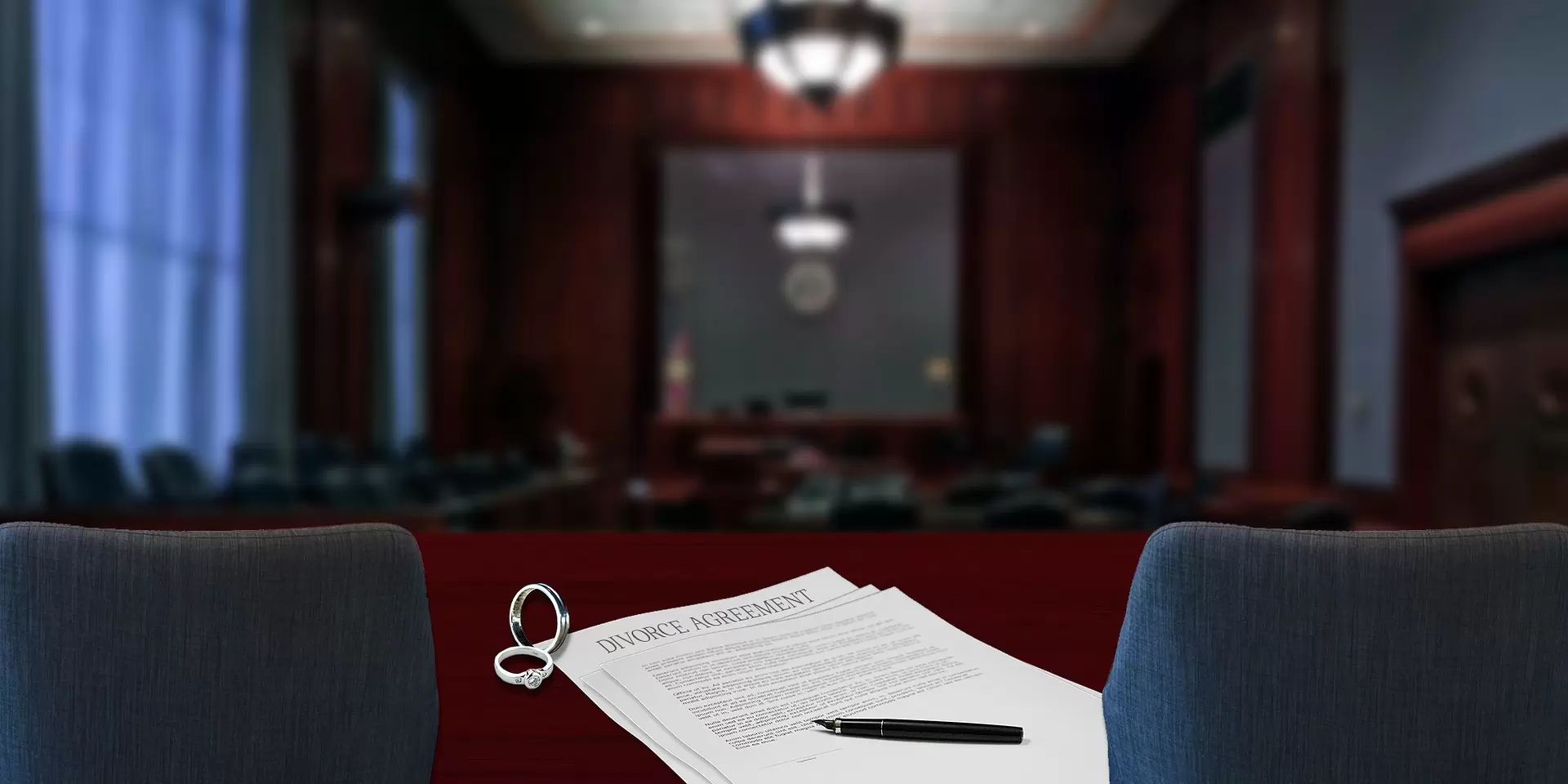
Divorce can often be a complex and emotionally difficult process to endure. However, for those who have married abroad and must go through a divorce in Spain, there are the additional difficulties and uncertainties related to language and foreign laws, not to mention potentially little or no emotional support for those who are 'strangers in a strange land'.
Here we try to summarise the main concepts and processes you should be aware of in order to demystify the divorce process in Spain and provide an understanding of the more important legal concepts that will help you to navigate Spanish family law procedures.

1. Spanish Divorce Law: Grounds for divorce in Spain
In Spain there is no requirement to allege any cause or reason, though there must be a judicial decree and the marriage must have lasted no less than three months before proceedings are initiated. Since 2005, when the relevant Spanish legislation was introduced, there is effectively no fault divorce in Spain.
The main effects of a divorce in Spain are that, by bringing the marriage to an end, any joint financial liabilities of the couple as against third parties are terminated while also noteworthy is the end to the right to inherit the assets of an ex-spouse upon their death.
Want to hear what other clients
are saying about us?
2. How does divorce law in Spain differ from the UK?
Until the introduction in the UK of the Divorce, Dissolution and Separation Act 2020, a major difference between divorce law in Spain and the UK had been the fact that in Spain it was unnecessary (since 2005) to allege grounds to initiate a divorce.
Now both countries have done away with the requirement to allege grounds.
Under Spanish divorce law, a divorce may only proceed 3-months after the marriage took place. In the UK, the original provisions in the Matrimonial Causes Act 1973 would seem to persist, and require that the marriage took place at least a year before the divorce process may be initiated.
Another major difference between Spanish and UK divorce law lies in custody arrangements, whereby Spanish divorce law has a presumption of joint custody of any children of the marriage. While this is not the case in all of Spain, being the jurisdiction of the Autonomous Communities in Spain, it has been adopted by many. In the UK, the mother of the children would be expected to be awarded custody.
Finally, in Spain, being a Roman law jurisdiction, there exists the concept of 'regimes' of marriage, which determine how assets accumulated before and during the marriage should be distributed.
These Matrimonial Property Regimes regimes determine how assets are divided upon divorce. The default regime in most of Spain is the "sociedad de gananciales" (community property), but couples can choose a different regime before marriage. This system significantly impacts asset division during divorce proceedings.
Accordingly, a married couple may be considered to have separate assets and therefore, should the marriage be dissolved, each spouse would retain any private assets they held and accumulated during a marriage, including work income, private inheritances and pensions. Though once again, this depends on the region in which the marriage took place and the couple lived.
In the UK there is a presumption that assets accumulated during the marriage are split equally between the spouses.
It is also worth noting that while there appears to be a rather ad hoc approach to the enforcement of prenuptial agreements in the UK, they are enforced in Spain. Determining the jurisdiction that can or should process the divorce proceedings is complex in itself and is, at least, partly regulated by EU law in this area.
3. Separation and divorce in Spain
It is often the case that a married couple may decide to become legally separated instead of getting divorced when the marital relationship breaks down. This is usually a decision taken together by mutual consent and is considered to be a less drastic and final step as a divorce. However, there are legal consequences that flow from a legal separation.
It is to be noted that a regulatory agreement must be signed between the spouses to regulate matters such as the continuing parental responsibility of each spouse towards their children, parenting plan, custody of the children and visitation rights of the non-custodial parent, use of the matrimonial home, child support, spousal maintenance etc. In contrast to divorce, the spouses are not permitted to remarry.
4. Legal Status and Recognition
For non-Spanish couples seeking divorce in Spain, an important consideration is the recognition of their marriage and legal status. Foreign marriages may require an Exequatur procedure - a legal process that validates foreign court decisions in Spain. This is particularly relevant for marriages and divorces from non-EU countries that need to be recognised by the Spanish legal system.
The concept of legal residence plays a crucial role in divorce proceedings, as at least one spouse must be legally resident in Spain to file for divorce. For a Non-EU Citizen, maintaining legal residence status during and after divorce proceedings requires special attention, particularly if their residence permit was obtained through marriage to an EU citizen.
5. Who may make a divorce petition in Spain and how does this affect proceedings?
Both of the spouses may seek a divorce petition together, in which case it is known as a divorce by ‘mutual agreement’ (more commonly as an Express Divorce).
Alternatively, one of the spouses alone may request a dissolution of the marriage, in which case it is known as a contested divorce.
It is important to note that the person who petitions a divorce in Spain must be resident in Spain or their last place of residence as a married couple must have been in Spain. This is the case even though the spouse did not register the marriage in Spain.
For Foreign Nationals residing in Spain, the process of filing for divorce may involve additional steps. They may need to provide extra documentation, such as proof of residency or translated versions of their marriage certificate. It's advisable for foreign nationals to consult with a family lawyer familiar with international divorce cases to navigate these complexities.
6. Uncontested divorce in Spain (Express Divorce)
A divorce by mutual agreement, regulated by Article 90 of the Spanish Civil Code, saves time and money. If a married couple can reach agreement on custody, child support and matrimonial property usage matters from the outset, the divorce process becomes much quicker and, consequently, cheaper.
Of course, this may not always be possible, but it is certainly preferred.
Once agreement in these matters has been reached, a divorce lawyer will formally draft the agreement, known in Spain as a convenio. This will be submitted to the appropriate body, usually the Family law Court in Spain.
When applying for the divorce by mutual consent, the parties should present:
- Marriage Certificate (available from the Civil Registry),
- Children's Birth certificates (also available from the Civil Registry where born in Spain),
- Certificate of empadronamiento of one of the spouses (available from the local town hall)
- The 'Convenio' agreement
- Any additional Documentation required for foreign nationals, such as residency permits or translated legal documents
7. Contested divorce in Spain
A 'contested' divorce refers to divorce proceedings where there is disagreement as to any of the terms of the divorce.
Therefore, if the divorcing couple cannot agree as to the distribution of any marital assets, custody of children, amounts of child maintenance etc the matter must be dealt with in full divorce proceedings before a judge with lawyers advocating on behalf of each spouse.
Since the absence of agreement requires negotiation between the legal representatives this necessarily increases the time and cost of the proceedings. Should it not be possible to reach an agreement then the matter will be decided by the judge hearing the divorce proceedings.
The proceedings themselves are longer and the lawyers require more preparation time as well as spending more time in court representing the spouse. Again this increases costs.

8. Appeal Process in Spanish Divorce Cases
In Spanish divorce proceedings, either party has the right to Appeal the court's decision if they disagree with the outcome. The appeal must be filed within 20 working days of receiving the court's decision.
It's important to note that appeals can significantly extend the duration and cost of divorce proceedings. Grounds for appeal may include errors in the application of law, procedural irregularities, or new evidence that wasn't available during the initial trial.
9. How much does a divorce cost in Spain?
The cost of divorce in Spain will vary according to its complexity. The more complex, the more time the lawyer will need to dedicate to the matter in order to finalise the process. Typically, complexity in divorce proceedings will increase depending on the following factors:
Agreement between the spouses - this factor is possibly the most important. Failure to agree can require negotiation on all aspects of the divorce and can greatly increase the time that the lawyer needs to dedicate to the matter.
Location of the spouses - where the spouses are living in different jurisdictions, notification and other communication aspects can become more complex and time-consuming
Assets - the more assets the spouses have, the more paperwork needs to be filed and legal analysis needs to be carried out regarding the distribution to the separating spouses
Children of the marriage - should there be children then a number of different aspects need to be considered, analysed and potentially negotiated, including child custody, child maintenance to be paid by any non-custodial parent, attribution of the family home to the custodial parent, if any etc
Typically, the most simple of divorces will involve legal fees of €7-800 plus the costs of procurador and powers of attorney. The cost will increase from there, based on the complexity of the case.
10. How long does it take to get a divorce in Spain?
A divorce by mutual accord can be concluded in as little as a few weeks whereas a contentious divorce may last anywhere from a few months to more than a year. It is therefore of course always preferable to follow the course of divorce by ‘mutual accord’ wherever possible.

11. If either of the spouses is not Spanish, how does this affect divorce proceedings?
European Regulations (specifically European Regulation 2201/2003), provide that a Spanish court may adjudicate divorce proceedings involving any Spanish resident. Accordingly, where at least one spouse is habitually resident in Spain, the Spanish courts may hear the case, including when not married in Spain
Council Regulation (EU) No. 2201/2003 of 27 November 2003 - fixes a list of potential countries in which a Court may be entitled to hear the case: New EU Divorce Procedure allows Courts of the Member State in whose territory the spouses are habitually resident, or where the respondent is habitually resident, where the spouses were last habitually resident, etc.
Depending on the case, the Courts of more than one Member State could have competence for hearing a divorce petition; in those cases, the party filing the petition first will have an opportunity to choose the courts that will mostly benefit their position.
As the main consequences of your international divorce may strongly vary depending on the country where your case would be heard and the law used during the proceedings, it is recommended that you obtain expert advice as soon as you have the divorce in your mind in order to determine the best legal strategy for your family.
As far as the applicable law, Articles 9.2 and 107 of the Spanish Civil Code establish that the applicable law is, in the first place, the family law of the country of which both spouses are nationals. Where there is no common nationality, the applicable law is the law of the state in which both are habitually resident at the time of divorce.
Accordingly, a married couple composed of a Spanish national and a British national would have the Spanish law of divorce applied where both are resident in Spain. Meanwhile an Irish couple who apply for a divorce in Spain may have Irish law applied or request to have Spanish family law applied should they wish.
Where there is neither common nationality nor country of common residence, the law of the state in which the couple were last both habitually resident is the governing convention.
Also worth noting is the effect a divorce may have on residency status for couples that consist of at least one non-EU partner. Should the non-EU partner be in a position to request Spanish citizenship, there would be no impact.
Non-EU Citizens must ensure their residence status remains valid throughout the proceedings. The legal consequences of divorce can affect their right to remain in Spain, particularly if their residence permit was contingent on their marriage to an EU citizen. In such cases, they may need to apply for a modification of their residence permit or seek alternative grounds for remaining in Spain.
Want to hear what other clients
are saying about us?
12. In which jurisdiction should divorce proceedings take place where the spouses are in different countries?
When considering the difficult and complex situations that arise with separations and divorces, either between married couples or those in domestic partnerships it is necessary to bear in mind three fundamental factors:
- Which jurisdiction will be competent to hear the matter.
- Which state’s legislation will apply to the proceedings.
- With regard to the distribution of the matrimonial assets, what is the legal framework that underpins the ownership of those assets within the marriage.
Regarding the competent jurisdiction, within the context of the European Union, residency is key and European International Divorce Council Regulation 2201/2003, with respect to jurisdictional competence, recognition and enforcement of judicial decisions in matrimonial matters and parental responsibility, establishes that competence to hear divorce and similar proceedings lies with the State in which the spouses habitually reside, with some special individual rules for exceptional cases.
When there are children involved in the proceedings, the Spanish Courts will also have competence to hear the case, when the child has close ties to Spain, even where at the time that the proceedings are filed, the child is resident in a State, outside the European Union.
13. Is it necessary to travel to Spain for divorce proceedings to be concluded?
No. It is of course necessary for the parties to communicate and a number of forms and documents need to be signed, but this can be managed by post. Ratification of the divorce agreement before the judge normally requires the presence of both spouses.
That said, if one or both of the spouses is no longer living in Spain, this can be accomplished by issuing a power of attorney in favour of the procurador (an officer of the court required when a person takes part in Court proceedings in Spain). This power of attorney needs to be specially arranged via a lawyer and notary.
14. What happens with regard to custody of children following divorce in Spain?
In Spanish law, the concept of Parental Responsibility is central to child custody arrangements. This responsibility encompasses not only the day-to-day care of the child but also important decisions regarding education, health, and overall welfare. Even if one parent is granted sole custody, both parents typically retain parental responsibility unless the court decides otherwise for the child's best interest.
The following process applies regardless of whether the parents of the children are unmarried or married.
Where the parties agree via a ‘convenio’ or written agreement on issues such as child custody and visitation rights, a judge will review any agreement and adjust as required, taking into account the best interests of the children involved. A judge may make an order awarding custody to one of the parents, or to both in an order of ‘joint custody’.
In most regions of Spain it is normal to award custody to one of the parents, typically the mother. However in some regions it is now law that the judge must consider the awarding of ‘joint custody’.
With regard to parents of different nationalities, something that many are unaware of - is that moving back to your country of origin with your kids - without the consent of the other parent - might be a crime.
While a divorce petition can be submitted in different countries depending on your case, when we speak about child custody we must take into account that only a Court in the country where the children have their ordinary residence may hear a custody claim and make a decision according to the Council Regulation (EU) No. 2201/2003 of 27 November 2003, also known as “Brussels II bis”.
More information about cohabitation and custody arrangements in your area of Spain can be found in Child Custody In Spain.

15. May a parent take a child to another country following a divorce in Spain?
If a parent is awarded sole custody of the children then whether or not the children can be taken to live in another country may have to be decided by a court if the non-custodial parent is not in agreement with the move.
This is because the non-custodial parent retains the right to visitation which would be seriously eroded in the case of the children moving to another country.
If a judge decides that the move is in the best interests of the children and that there is sufficient family support in the planned destination then it can be approved.
In such a case it is likely that provisions would need to be made to maintain contact with the non-custodial parent during holidays etc.
Should a child be taken to another country without consent or retains a child in another country without consent from the other parent, what legal options are available?
As we know, prevention is always better than cure, and the Spanish Civil Code allows a series of measures to be taken in order to avoid children in danger from being abducted. In particular, Article 103.1 allows for measures to be taken that:
- Prohibit a child from exiting the country, without prior judicial approval;
- Prohibit the issuing of a passport to a child or the removal of same if it has already been issued;
- Require judicial approval before any change in the child’s home address
If a child has already been abducted, the matter is obviously much more complicated, though a number of options exist: in the first place, it is necessary to check if the State to which the child has been illegally taken is a signatory to the Hague Convention of the 25th of October, 1980.
If this is the case, proceedings can be initiated via the ‘Central Authority’, which is the tribunal that monitors compliance with the Convention and which coordinates directly with the relevant authorities in each country (each country that is a signatory to the Convention must establish their own Central Authority).
If the country to which the children have been taken is not a signatory to the Hague Convention, then it would remain for diplomatic solutions to be attempted via the embassy of the relevant country or by taking legal action directly in the country concerned. Of course, to contemplate such action would require legal advice in that State.
Within the member states of the European Union, instead of the Hague Convention, it is mandatory to make an application under Regulation 2201/2003 which regulates the competencies, recognition and enforcement of judicial decisions related to matrimonial matters and issues relating to parental responsibility and makes the competent judicial authority, the court of first instance.
Want to hear what other clients
are saying about us?
16. What is the Spanish law relating to child support?
Whether or not the parents of a child are married there is a legal responsibility to provide for the child before and after any divorce, separation or break-up between the parents.
Sometimes referred to as children's alimony, Child maintenance covers such basic matters as accommodation, feeding, clothing and education. A divorce agreement will contain details of any maintenance provision that is to be made by the parents. This is because even though both parents are equally responsible to provide for their children they may not both have the same resources. In the absence of any such agreement a court will determine the responsibilities of each parent to provide for the children and to do so regard shall be had to the income of both parents as well as liabilities.
Failure to comply with child maintenance payments can result in fines as well as the embargo of income and possessions.
A civil action for compliance should be filed in the court where the original order was made. Should a parent be unable to comply with the decree of the court due to a substantial change in circumstances, they should request an order amending the agreement such that the amounts due to be paid may be lowered. 
17. What happens to the family home following a divorce in Spain?
In the absence of children or any express agreement between the spouses, the home shall be retained by the original owner. If the property is jointly owned then typically the property is sold and the proceeds shared or one spouse pays the other to take the entire property.
Where there are children and custody has been awarded to one parent only then use and enjoyment of the family home will be awarded to that parent until such time as the children become emancipated. The order relates to use and enjoyment and not ownership. When appropriate the home may be sold and the proceeds shared.
However, as often is the case when dealing with separating couples, there are a number of different and more complex scenarios to consider, which we do so in the article: The Marital Home after divorce or separation.
18. Who is responsible for the mortgage and household bills after a divorce?
Other financial aspects of dicorce such as responsibility for payment of any household bills usually belongs to the spouse who has use of the property though the contrary may be specified in any divorce agreement or ‘convenio’.
With regard to a mortgage, as far as the financial institution is concerned, liability continues and so the owner of the property must continue to discharge the mortgage to avoid losing the property. Where both of the spouses were jointly liable for the mortgage this therefore continues to be the case and the non-custodial spouse must continue to pay their portion of the mortgage though they do not personally use the property.
The need to pay for accommodation elsewhere while paying towards the mortgage of the marital home should be reflected when calculating the child maintenance or alimony liability.
Should the spouse who has retained the use and enjoyment of a jointly-owned property start cohabiting with a new partner, it will be open to the ex-spouse to request an order from the court adjusting the original agreement due to a substantial change in circumstances.
19. When is alimony awarded in Spain?
A Spanish court will make an award of financial compensation or spousal support from one spouse to the benefit of the other only where an economic imbalance has been created as a result of the divorce and thus requires economic compensation in order to establish an equitable outcome.
According to the Spanish Supreme Court, alimony awards vary according to relevant factors including dedication past and future to the children, age of the spouses, duration of the marriage, education and likelihood to gain employment, assistance given to the other spouse in their professional activity and any other relevant factor.
So, for example, where a spouse has dedicated many years to raising the children, at the expense of pursuing a career while assisting the other spouse in their profession a divorce may well lead to an economic imbalance and alimony awarded – especially where there is little prospect of the stay at home spouse gaining new employment. Spousal maintenance may be awarded indefinitely or temporarily or as a lump sum.
In terms of the amount of financial support likely to be awarded, it is difficult to be precise but the awards to date would tend to vary between 15% and 40% of the salary of the spouse with the higher income. Payment is normally made by bank transfer and is adjusted each year according to the inflation rate (IPC).
The award may be made for life or for a period of years after which payments will cease. Should the economic situation of either or both of the spouses change however, then the award of alimony in Spain may be changed by an application to the court.
20. How might a new relationship affect alimony and child maintenance?
Where a person receiving alimony payments remarries or lives with another person in a matrimonial relationship the cause that gave rise to the alimony ceases as does the right to receive alimony payments.
It is not necessary that there is cohabitation but that there is a sentimental relationship. The fact that the custodial parent enters into a relationship with a person other than the non-custodial parent does not affect the responsibility that the non-custodial parent has towards the children.
21. Division of assets and wealth distribution
Probably one of the most contentious issues to be dealt with in a divorce, with the exception perhaps of child custody arrangements, is the distribution of marital assets.
While this is a complex area of law when both of the parties are of the same nationality and are divorcing in the country where they were married, it becomes even more so where the parties divorce in a country different to the place where they are married and, very possibly, the spouses are not of the same nationality and the country where the divorce proceedings are to take place has a different legal system than the countries of their nationalities!
One of the first questions that needs to be answered is which law is to be applied to the divorce proceedings. The answer to this will vary according to place of marriage, nationality of the couple divorcing and their current place of residence.
While a Spanish court would be expected to apply Spanish law, it is possible to request the application of another law on the basis of the factors listed above. However, this will normally increase the costs involved as both parties will seek to provide the judge with their own, alternative viewpoints on the application of that law, according to the opinion of the legal experts in that country that the spouses will have to separately engage.
The law that is applied will of course determine the manner in which any assets are distributed. We deal with this in more depth here: Distribution of Matrimonial Assets following divorce in Spain.
22. Civil partnerships and Cohabiting Couples
In Spain, unmarried couples can formalize their relationship through either a Civil Partnership or Pareja de Hecho (registered domestic partnership). While similar, these arrangements have distinct legal consequences that differ from marriage, particularly in terms of property rights and inheritance.
To register as a Pareja de Hecho, couples must apply through the Central Registry in their autonomous community. Each region maintains its own registry and requirements, though generally, couples must prove they have lived together for a minimum period and show they are not married to others.
The dissolution of these partnerships follows different procedures than divorce, though many regions now grant similar rights to registered partners as married couples. However, it's important to note that these rights may not be automatically recognized in other countries, which can create complications for international couples.A distinction should be made between those purely ‘economic’ matters and those which have to do with child custody and maintenance or visitation rights which impact on public order and are consequently handled differently.
Most regions of Spain recognize the ability of the couple to agree as to the economic impact of any future separation though some regions insist that the agreement be made in public and witnessed by a notary in order for them to have any effect.
In the absence of an agreement the courts tend to impute a desire to remain economically independent and that there should be no continuing economic liability as between the couple, once separated. General principles of law apply such that one should not be unjustly enriched at the expense of another which may impact on the distribution of common assets.
Regarding matters such as child custody, visitation rights, use of the shared home and payment of child maintenance the courts have tended to replicate the law applicable to married couples when considering cases involving civil partnerships. Such matters can be agreed by mutual accord and if not, a petition may be made to the court for an order ‘de medidas paterno-filiales’ such that the court make a direction in respect of those issues.
23. Same sex couples
In Spain same sex married couples have the same rights and obligations as married couples of opposite sexes and so the above information is equally applicable.
Want to hear what other clients
are saying about us?
24. Frequently Asked Questions
What are the rules for divorce in Spain?
In Spain, the divorce process follows a no-fault system, meaning that neither spouse needs to provide a reason or prove fault to file for divorce. You can initiate divorce proceedings after being married for at least three months. The rules are the same for both heterosexual and same-sex couples. Additionally, if there is mutual consent, the process can be quicker and simpler, often finalized through a notary. In the absence of mutual consent, the process involves the court, which may take longer.
How are assets divided in a divorce in Spain?
In Spain, the default rule is that assets acquired during the marriage are divided equally, with each spouse receiving 50%. However, the exact outcome can vary based on the region's specific marital property regime and any unique circumstances that may require provisional measures. Additionally, if a prenuptial agreement exists, it can also influence how assets are divided.
How much does it cost to get a divorce in Spain?
The cost of getting a divorce in Spain varies depending on whether the divorce is amicable or contested. For a non-contentious divorce, legal fees generally range from €600 to €1200 plus VAT. In cases where the divorce is contentious, the costs can increase to €1500 to €2000 or more, depending on the complexity. Additionally, you will need to consider Procurador fees, which are required for court representation. If your divorce involves creating agreements for the custody of children or the distribution of marital assets, these factors can further increase the overall costs.
How long does express divorce take in Spain?
The duration of an express divorce in Spain can vary depending on several factors. Generally, an uncontested express divorce may take as little as 2 to 3 months to complete. This timeframe can be shorter if the divorce is straightforward, with no children or significant assets involved, and both parties are in agreement. However, if there are complications or delays in obtaining the necessary documents, it could take longer. All too often delays in accessing the overloaded Family Court system in Spain can also delay matters.
What is an Exequatur and when is it needed?
An Exequatur is a legal procedure required to validate foreign court decisions, including marriages and divorces, in Spain. This process is particularly important for non-EU citizens who were married or divorced outside the EU and need their status recognized in Spain.
What's the difference between Civil Partnership and Pareja de Hecho?
While both terms refer to registered partnerships, a Civil Partnership and Pareja de Hecho can have different legal consequences depending on the autonomous community. The main difference lies in how they're registered and the specific rights they confer. Registration must be done through the Central Registry of the respective autonomous community.









